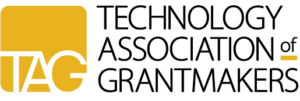As the landscape of philanthropy continues to evolve, one thing remains constant: technology must serve people, not the other way around. The trends below signal more than purely technological shifts; they are a call to action for the sector to focus on making technology work for everyone.
In 2025, no organization can afford to exclude technology from its strategy, nor can the social sector ignore the ubiquitous role that technology plays in our lives. The continuous challenge for change agents and philanthropic leaders will be to ensure that their digital solutions are grounded in the needs of people, rather than just the promise of innovation. By putting people first, we can build a future where technology serves as a tool for fostering inclusion, expanding accessibility, and bridging divides.
Here’s what to watch for – and act on – in the year ahead:
Data Is Digital Gold
Data is the lifeblood of effective philanthropy and essential to communicating and advancing impact. Organizations that prioritize robust data governance and unlock insights from large datasets will make better decisions, communicate their impact effectively, and gain a competitive edge. Those that lag in their data management practices risk becoming irrelevant. It’s time to treat data as digital gold — the organizations that do so will reap the rewards.
Managing Complex Risks
From sophisticated cyberattacks to misinformation-fueled harassment, the risks facing philanthropic organizations are only mounting. Protecting sensitive donor data, grantee information, and organizational integrity requires more than reactive measures. Adopting a multifaceted approach to security that includes advanced cybersecurity measures, comprehensive risk assessments, and enhanced protocols to safeguard personnel and facilities is imperative.
Continuing Growth of AI Adoption
As AI tools continue to be a staple for individuals, the social sector may see a leap in the adoption of industry-specific AI applications. This year, more organizations will begin to enjoy enterprise solutions aimed at optimizing grantmaking, streamlining operations, and enhancing program delivery. However, responsible adoption is critical. Addressing ethical concerns, societal impacts, and environmental considerations head-on will ensure AI solutions align with your mission and amplify your impact, not your challenges.
Streamlining and Cost Reduction
With transactional costs and the burden of technical debt weighing on organizations, grantmakers will look for creative ways to streamline. With more than 80% of private independent organizations operating in hybrid or remote models, the focus must shift to eliminating technical debt, streamlining outdated systems, and reducing administrative burdens. The shift is not just about saving money; it’s about business continuity, making processes more effective, secure, and accessible for everyone involved.
Navigating Constant Change
The pace of change in technology is unrelenting, and non-technical staff are increasingly bearing the brunt of it. This trend is leading to increased fatigue and burnout, especially among those juggling multiple roles. To combat fatigue and burnout, organizations must invest in training, provide adequate resources, and foster a culture of adaptability to ensure innovation doesn’t come at the cost of staff well-being.
One thing these predictions share is a common theme and a call to action for our sector: we need to prioritize people’s needs and make technology impactful and accessible for all.
The future is a canvas waiting for paint. These trends hold immense potential for both opportunity and risk, but it’s clear that the future requires us to lead with our values and stay steadfastly true to our missions if we are sincere about making technology work for everyone.
— Jean Westrick
Executive Director, Technology Association of Grantmakers
